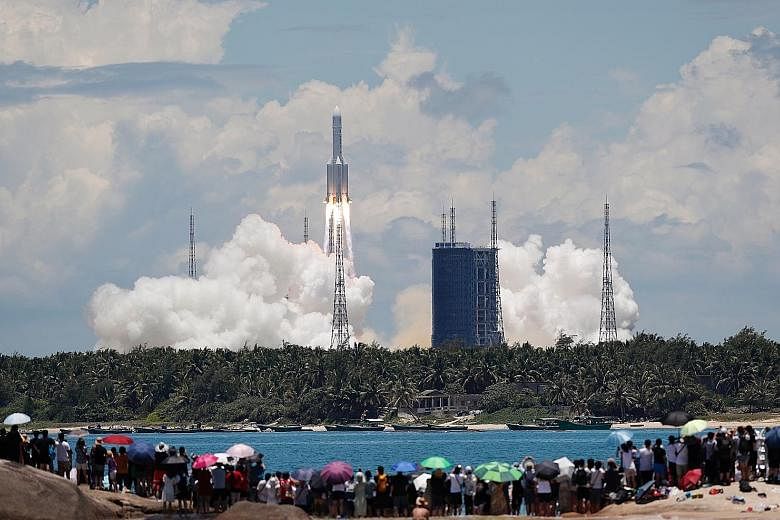WENCHANG (China) • China successfully launched an unmanned probe to Mars yesterday in its first independent mission to another planet, a bid for global leadership in space and a display of its technological prowess and ambition.
Its largest carrier rocket, the Long March 5 Y-4, blasted off with the probe at 12.41 pm local time from the Wenchang Space Launch Centre on the southern island of Hainan.
The probe is named Tianwen-1, meaning "Questions to Heaven", the name of a poem written two millennia ago about the cosmos.
It will arrive in the Red Planet's orbit in February next year after a seven-month voyage over 55 million km, and will deploy the rover to Mars three months later.
If successful, China will become the first country to orbit, land and deploy a rover in its inaugural mission.
There will be challenges ahead as the craft nears Mars, mission spokesman Liu Tongjie told reporters ahead of the launch.
"When arriving in the vicinity of Mars, it is very critical to decelerate. If the deceleration process is not right, or if flight precision is not sufficient, the probe would not be captured by Mars," he said, referring to gravity on Mars taking the craft down to the surface.
He said the probe would orbit Mars for about 21/2 months and look for an opportunity to enter its atmosphere and make a soft landing.
"Entering, deceleration and landing (EDL) is a very difficult (process). We believe China's EDL process can still be successful, and the spacecraft can land safely," he said.
Mr Liu said both the Tianwen orbiter and rover will relay Mars data back to Earth, including on its morphology and geological structure, water ice distribution, climate information, and internal structure.
The United Arab Emirates launched a probe on Monday that will orbit Mars once it reaches the Red Planet. But the race to watch is between the United States and China, which has worked furiously to try and match Washington's supremacy in space.
-
2.5
Number of months the Chinese probe, Tianwen-1, meaning "Questions to Heaven", will orbit Mars, according to mission spokesman Liu Tongjie. It will look for an opportunity to enter its atmosphere and make a soft landing.
Nasa, the American space agency, has already sent four rovers to Mars since the late 1990s. The next one, Perseverance, is an SUV-size vehicle that will look for signs of ancient microbial life, and gather rock and soil samples with the goal of bringing them back to Earth on another mission in 2031.
"As a first try for China, I don't expect it to do anything significant beyond what the US has already done," said astronomer Jonathan McDowell at the Harvard-Smithsonian Centre for Astrophysics. Tianwen-1 is "broadly comparable to Viking in its scope and ambition", he said, referring to Nasa's landing missions in 1975-1976.
After watching the US and the Soviet Union lead the way during the Cold War, China has poured billions of dollars into its military-led space programme.
"China joining (the Mars race) will change the situation dominated by the US for half a century," said analyst Chen Lan at GoTaikonauts, which specialises in China's space programme.
China has made huge strides in the past decade, sending a human into space in 2003.
The Asian powerhouse has laid the groundwork to assemble a space station by 2022 and gain a permanent foothold in Earth orbit.
China has already sent two rovers to the Moon. With the second, China became the first country to make a successful soft landing on the far side. The Moon missions gave China experience in operating spacecraft beyond Earth's orbit, but Mars is another story.
The much greater distance means "a bigger light travel time, so you have to do things more slowly as the radio signal round trip time is large", said Mr McDowell.
It also means "you need a more sensitive ground station on Earth because the signals will be much fainter", he added, noting that there is a greater risk of failure.
REUTERS, AGENCE FRANCE-PRESSE

